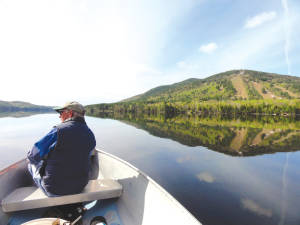Guest column: EPA budget cuts will hurt lakes
LEA Assistant Director
Simply put, the lakes of Maine have benefitted from the Environmental Protection Agency (EPA). Through the agency, funds have been awarded to fix local roads and properties that were negatively impacting our lakes, streams and rivers. These moneys have been spent by public works departments and local contractors to upgrade culverts, armor ditches, install detention basins and restore protective buffers near waterways. These funds do not just protect our lakes; they improve our public infrastructure. And because all funds received have to be matched, dollar for dollar, by local sources, they are spent very wisely.
Some have argued that the massive budget cuts proposed for the EPA will have little effect because state environmental protections are already strong and fully in place. Unfortunately, this argument is critically flawed.
In Maine, like many other states, a substantial portion of funding for the State Department of Environmental Protection (DEP) comes from the EPA. This is particularly true when it comes to lake and watershed protection. Maine receives millions of dollars from the EPA to staff and operate the non-point source pollution prevention program, which funds virtually all watershed work in the state.
The state’s lake monitoring and assessment program is also primarily funded by the EPA. The folks in this program are responsible for conducting research on lake systems, overseeing lake monitoring, and serving as a repository for water quality data for the entire state of Maine. These programs are already underfunded, so the proposed 31% cuts to the EPA would hobble lake protection and monitoring efforts across the state.
But, lake and watershed programs are not the only items on the chopping block. Under what are called “performance partnership grants,†the EPA funds the state’s Underground Storage Tank Program, Wastewater Treatment Program, Air Quality Program, Healthy Beaches Program, Lead Abatement Program and Asbestos Abatement Program. The EPA also funds the National Estuarine Program, which helps to keep the Wells National Estuarine Research Reserve and the Casco Bay Estuary Partnership running. Both of these organizations have done tremendous work in the state to help protect, preserve and monitor marine and freshwater systems.
In our area, there have been many EPA-funded watershed projects that have resulted in containment of a huge amount of phosphorus (the nutrient that controls algae growth in lakes) and the prevention of tons and tons of sediment from reaching our lakes. In virtually every one of these projects, the town, soil and water conservation district, local lake association, local camps and businesses and hundreds of landowners were involved. These projects work because everyone contributes and everyone is involved from the beginning of the project to the very end. In the last few years, EPA funds have been used on projects on Bear Pond, Hancock Pond, Highland Lake, Keoka Lake, Long Lake, McWain Pond, Moose Pond, Sand Pond and Woods Pond.
In addition to the dramatic cut in EPA funding, the current budget proposal calls for the repeal of the Clean Waters Rule, also known as WOTUS (Waters of the United States). This rule specifies that headwater streams and wetlands qualify for protection under the Clean Water Act. It was put in place as a response to concerns over a lack of clarity in the regulations by developers, environmentalists and legislators. While many folks had interpreted or assumed that the Clean Water Act protected these waters since its inception, this rule makes it clear. And it is not only a matter of clarity: WOTUS is based on the overwhelming scientific evidence that protection of feeder streams and wetlands protects downstream water quality. This is particularly important for lakes, which are often the receiving waters. Without this rule in place, protections for these critical areas will be severely weakened.
We need to keep a strong support system in place for our lakes and right now the ball is in the Senate’s court. The Senate will be voting on this proposed budget at the end of the first full week of December, and members on both sides of the aisle will get to weigh in on these program cuts. Please help our lakes by letting our senators know you oppose EPA budget cuts and the repeal of WOTUS. Senator Susan Collins can be reached at 784-6969 and Senator Angus King can be reached at 622-8292. Out-of-state residents can also register their concerns with their home state representatives.


